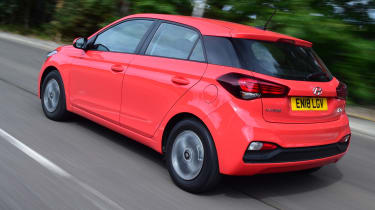Hyundai i20 hatchback (2015-2020) - MPG, running costs & CO2
The total cost of Hyundai i20 ownership is relatively low, but its engines could be more efficient
Of the wide range of i20 petrol engines, some were used in the previous model, so their fuel economy lags a little behind that of newer engines offered by other manufacturers. That said, the 1.0-litre turbocharged petrol is a modern, efficient engine. Hyundais are usually cheap to service and insure and the i20 is no different. It also benefits from the manufacturer’s excellent five-year/unlimited-mileage warranty.
Hyundai i20 MPG & CO2
The most frugal i20 is the 99bhp 1.0 T-GDi which returns 49.6mpg and emits 129g/km of CO2 in both SE, Play and Premium Nav trims and it also returns 47.9mpg if mated with Hyundai’s automatic gearbox, too. The most powerful 118bhp version of the 1.0 T-GDi engine is only available in the Premium SE Nav model, but it doesn’t lag too far behind the lower-powered version, returning 47.1mpg and 137g/km of CO2. Road tax for all models is the standard £150 a year.
If most of your running is around town and you’re on a tight budget, you might prefer the cheaper 1.2-litre petrol, which is available in two power outputs. The 74bhp version returns up to 47.9mpg and emits 134g/km of CO2. The 84bhp version can return up to 47.9mpg and emits 134g/km CO2.
Insurance groups
The least powerful petrol version of the i20 fall into group six for insurance. From there, the car gradually climbs up to group 15 for the most powerful petrol models in top-of-the-range trim. This is very similar to the Volkswagen Polo, but the Ford Fiesta starts in group two.
Servicing
Hyundai offers three and five-year fixed-price service plans for the i20. Three years costs just over £500 and five years around £1,000. You can pay extra to include MoT testing.
Warranty
Hyundai offers an excellent five-year/unlimited-mileage warranty on all of its cars. Only Kia offers a better warranty than Hyundai, covering you for seven years or 100,000 miles.













